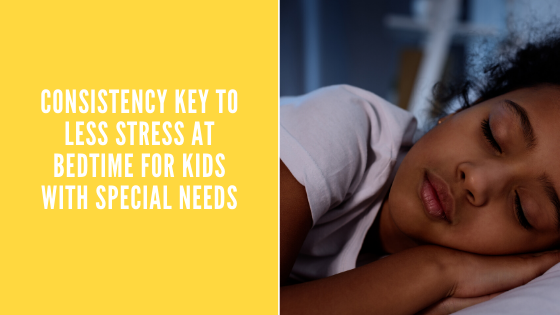When we do these monthly blogs, we focus on how these “celebrations & observations” relate to special needs kids. But when asked to write about “May Better Sleep Month,” I had a personal stake in it. I have not been sleeping well during the COVID19 crisis. How about you?
There was a recent study where 1,014 Americans from 18 years to 65 years and older were surveyed. Results were that 76.8% of participants stated that the Coronavirus outbreak did affect their sleep while only 23.2% said it didn’t.
Dr. Britney Blair, Licensed clinical psychologist, Board-certified behavioral sleep medicine specialist, responds:
I am not at all surprised at the results! The prevalence of insomnia, as you may know, is typically 30% in the general population, but with this collective trauma, we are seeing rates that are much higher! In addition, the lack of physical and mental stimulation, as well as the never ending onslaught of negative/panicked news, is impacting the quality of folk’s sleep as well as their dream content.
Imagine the stress levels for special needs kids? They may be confused by all the changes. The may not be able to grasp all the sides of the COVID19 puzzle.
Poor sleep has been known to cause reduced concentration, mood swings, irritability, stress, and a weakened immune system. Excessive stress could lead to narcolepsy, insomnia, restless leg syndrome, and sleep apnea.
In that survey, 46% of participants agreed that avoiding watching the news or reading about the COVID-19 pandemic helped them to sleep better. This was the most popular tactic followed by Reading (40%), Sleep Supplements (27%), and Meditation/Yoga (21%)
But what can you do for your kids suffering from poor sleeping?
Amy Kelly, MBA, MNM – Devereux Advanced Behavioral Health National Director of Family Engagement, offered some great suggestions in a recent blog.
Here is a key one: Create a sense of consistency! “Even though a new routine has been established, take time to point out things that are the same. For instance, you are still having Cheerios for breakfast. You are still watching your favorite TV shows. We have to brush our teeth. This may provide a sense of stability and reduce anxiety.”
Consistency will make bedtime less stressful.
She also suggests going back to basics on some levels with special needs kids. “Some of the activities we did with our kids when they were very young may bring comfort.”
As with adults, the sleep routine is affected by physical and emotional things special needs kids do long before bedtime
- Bring out your ”sensory bins:” Put something different in a bin – rice, beans, pasta, water. Then, place small “treasures” and a scoop/ladle in each container. Allow your children to play with these at the table. Challenge them to find the “treasures” – you can even create a checklist to see if they can find them all on a treasure hunt. Why do this? Sensory activities are suitable for calming the nervous system and bringing a sense of peace to many individuals with autism and special needs.
- Build a fort with cushions, blankets, and big boxes. Tap into their imagination by talking about “where” in the world their fort is located; invite some of their toys/stuffed animals to join the party.
- Don’t forget about classic toys like Playdough, which you can make at home and allows children a chance to explore their creative side. When it comes to learning and developing, individuals with disabilities want to play and have fun. Arts and crafts can keep kids entertained for hours while teaching them fine motor skills.
Whether you are an adult or a child, you still need to feel that someone is in control. Remain calm and create as much consistency as possible. Even if you need to design a new bedtime routine of no phones, no video games, no tv half hour before bed, just reading. Stick to it. The world is a scary place, more so with a killer virus. Make your routine your antidote to the craziness.
This post was written by Anthony M Scialis. Find him here.

